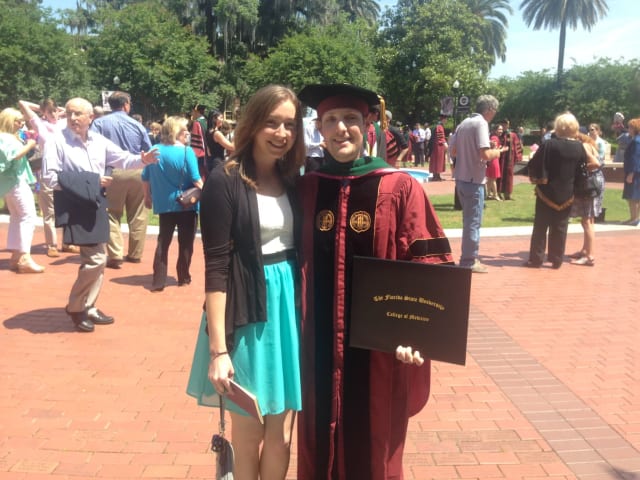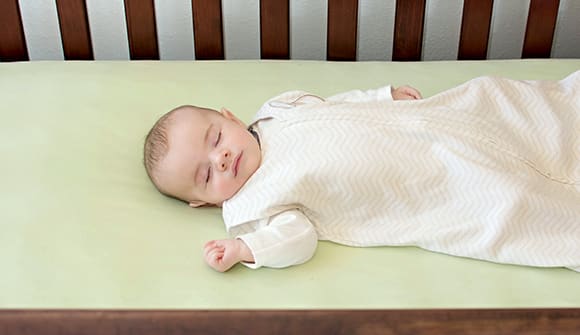From young patient to doctor
Childhood cancer survivor becomes a pediatric brain tumor specialist.
Article Date:

Darren Klawinski always had dreams of becoming a doctor.
When he was a young child in rural Indiana, his grandfather encouraged him to study hard so he could go to medical school and become a surgeon. His grandfather had a great respect for those in the medical field and spoke highly of a beloved family friend who was also a surgeon. It only seemed natural that Klawinski would go on to find his own footing in medicine, too.
However, those aspirations were shattered when, at the age of 12, Klawinski’s whole life changed. He was diagnosed with a brain tumor.
What he thought would be the end of his journey turned out to be the beginning of a different path inspired by personal experience.
Now a pediatric neuro-oncologist with Nemours Children’s Health, Jacksonville, and Wolfson Children’s Hospital, Klawinski’s own survivorship story gives him a rare and special perspective on treating children with cancer.
A devastating blow
Klawinski had a mostly healthy childhood. It wasn’t until the summer before seventh grade that he began experiencing severe migraines, unexplained nausea, and frequent vomiting. He once lost his balance and fell over when he bent down to tie his shoes, prompting his mom to seek medical help out of fear that something more ominous was going on with his health.
An MRI scan ordered by his pediatrician revealed that pre-teen Klawinski had a large mass on the backside of his brain and would need immediate surgery to remove it.
“I remember feeling overwhelmed with mixed emotions,” said Klawinski. “Hearing the term ‘brain tumor’ was scary and foreign. I was frightened. It seemed as if they couldn’t possibly be speaking about me. But on the other hand, I had been having strange symptoms for a while, and it felt somewhat like a small relief to finally figure out what was making me sick.”
Klawinski’s pediatrician referred him to pediatric specialists at Riley Children’s Hospital in Indianapolis, Ind., where brain surgery and a biopsy of the mass revealed the specific reason behind his mysterious illness. He had a medulloblastoma, a primary central nervous system tumor. Though rare, it’s the most common malignant brain tumor in children.
Following surgery, Klawinski’s doctors recommended a multimodality approach to treatment, with a combination of radiation therapy and chemotherapy. During this time, he also suffered from a constellation of surgery-related symptoms associated with posterior fossa syndrome. The syndrome is common for children who have had brain surgery near the backside of the skull, which is comprised of the brainstem and cerebellum, and can cause problems with speech, language, motor skills and mood.
Over the course of several months post-surgery, Klawinski had to learn to walk again with the help of pediatric physical therapists at Riley Children’s. He also had to relearn how to express himself through speech and other forms of communication, as well as overcome troubles with handwriting and double vision.
“I had conventional photon radiation therapy to treat my cancer, which is different than the more advanced proton therapy we have available today [at the UF Health Proton Therapy Institute in Jacksonville],” explained Klawinski. “The two therapy treatments kill cancerous cells very similarly, but the advantage to proton therapy is that it uses a high-energy beam of protons, instead of the high energy X-rays used in photon therapy, to deliver radiation to a very specific area. This limits the potential damage to surrounding healthy tissue and significantly decreases the risk of long-term side effects, which is especially important for children who are still growing and developing.”
The catalyst
One of the best outcomes of spending so much time at the hospital is that Klawinski developed a strong bond with his doctors and nurses.
“I really took a liking to my pediatric neuro-oncologist, Dr. Jeffrey Goldman,” said Klawinski. “Somehow, I managed to convince him to let me hang out in his office between my appointments and shadow him. I wasn’t seeing patients with him or anything, just learning more about the ins and outs of what a pediatric neuro-oncologist does. That’s when I really started to consider the possibility of a career in neuro-oncology instead of surgery.”
Klawinski completed more than a year of treatment before his cancer went into remission. Once healthy, he moved to South Florida with his family to finish high school. During his junior year, he received a letter from Dr. Goldman’s practice stating that his former pediatric neuro-oncologist was sick and would no longer be seeing patients.
“I hadn’t seen Dr. Goldman since I finished therapy and moved to Florida, so it was certainly a surprise to hear from him,” said Klawinski. “Even more so, I was very sad to hear he was ill.”
A month or two later, Klawinski received a package and letter from Dr. Goldman’s office containing an important pediatric oncology textbook his mentor always used. Dr. Goldman wrote that he had would already be gone by the time his former patient read his note, but that he wanted to gift him his book as he believed it would one day be of great use.
“I welcomed his outreach as a sign, pointing me in the path I was meant to pursue,” said Klawinski. “It was so out of the blue that it had to be more than just happenstance. It was in that moment that I truly realized I wanted to be a pediatric oncologist.”
A dream realized
Klawinski went on to finish high school and graduate from the University of South Florida. He received his medical degree from Florida State University’s College of Medicine and completed his clinical rotation and pediatric residency at Orlando Health Arnold Palmer Hospital for Children.
“When looking at places for my fellowship in hematology and oncology, I wanted somewhere that emphasized the importance of clinical research to better understand and treat childhood cancers,” now-Dr. Klawinski said. “I found that at Nemours Children’s Health, Jacksonville, and Wolfson Children’s Hospital. Speaking with Dr. Eric Sandler, medical director of Nemours and Wolfson Children’s Neuro-Oncology Program, and the rest of the clinical team encouraged me that this was a program that aspired to be world-class academic leaders for children with cancer.”
After completing his hematology and oncology fellowship at Nemours Children's, Dr. Klawinski furthered his studies by becoming one of just four fellows to graduate from the highly esteemed Neuro-Oncology Program at Nationwide Children’s Hospital in Columbus, Ohio.
In August 2021, Dr. Klawinski returned to Nemours Children’s Health, Jacksonville, and Wolfson Children’s Hospital, this time as a pediatric neuro-oncologist working alongside his former fellowship mentor, Dr. Sandler.
“I knew this was a place I needed to come back to,” Dr. Klawinski said. “There is so much promise and opportunity to continue growing the program here. State-of-the-art proton radiation therapy is also available here in Jacksonville, which very few pediatric cancer centers have right now.”
Dr. Klawinski looks forward to helping advance the pediatric neuro-oncology program through advanced types of targeted therapy for brain and spine tumors. He hopes to help give kids less toxic medicine and more targeted medicine to get to the same outcome.
“Brain cancers are different than other types of childhood cancers,” said Dr. Klawinski. “While we’ve made a lot of progress in being able to cure pediatric brain tumors, the cost can be significant because everything in the brain is high real estate. For example, IQ development may be hindered; radiation may cause other types of tumors later on. There is also the risk of underactive thyroid disease, hearing loss and other serious side effects.”
Dr. Klawinski concluded, “Targeted therapy is truly experimental therapy, and I believe there are huge benefits that can be gained. We’ve increased overall childhood cancer survival rates to more than 80%. I now want to focus on ensuring successful therapies provide young survivors with the best possible quality of life as they move into adolescence and adulthood. That is my hope for our program here in Northeast Florida.”
A cancer diagnosis can seem insurmountable to any family, but Wolfson Children’s Hospital has a comprehensive team of experts to help guide you through the process. For more information, call the Wolfson Children’s Cancer Center at 904.697.3600.



